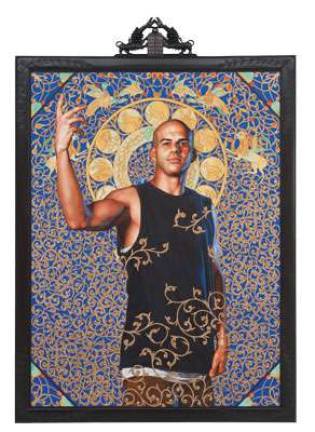Iconic Ambassadors

Kehinde Wiley's Cross-Cultural Pageant Kehinde Wiley uses deliberately flamboyant colors. Loud as hip-hop music and just as assertive are the grand claims Wiley makes for the subjects he paints: Young men of, yes, color stand out among the traditional, time-muted tints of the ancient and holy fabrics that frame them in the exhibition The World Stage: Israel at The Jewish Museum. Wiley picked his models, Ethiopian- and native-born Jews as well as Arabs, from dance clubs, arcades and street fairs in Israel. He looked for attitude that shows "how one puts oneself gracefully in the world." This is not hipster exoticism; their postures recall the imperiousness of Old World doges and potentates. Outside the museum realm, these poses would be called "swagger." The exhibition's name reflects Wiley's awareness that the eyes of world watch the underclass, whose members project exploitable, energized music and original personal style. He places their class struggle in flamboyant settings-in this case Torah ark curtains, wall hangings and bedcovers-that integrate alienated cultures. T-shirted torsos are wrapped in ornamental patterns-vines, serifs, animal figures-that grasp and cling like psychedelic tendrils. For Wiley, these young men act as iconic ambassadors of desire. Politicizing the ripeness of youth, Wiley demonstrates how hip-hop music and fashion, linked to foundational cultures that continually struggle for worldwide respect, have captivated the global imagination. Previous shows in Wiley's World Stage series featured brash young men from China, Africa, Brazil and India/Sri Lanka. It's an eye-catching brotherhood similar to the effrontery of Benneton and Desigual billboards- and these portraits are ads, too. They are products that endow the working class with the bright vibrancy of fancily dressed comic-book heroes. They are meant to pop. The Los Angeles-born Wiley was an impressionable 11-year-old when the L.A. rap group N.W.A. released Straight Outta Compton, the album with the notorious single "Fuck tha Police." It must have been strangely exciting to grow up on the outskirts of apartheid Hollywood, to see young black kids challenge police authority and rival a legendary cultural institution with gangsta rap, its own impudent music culture soon to claim the world. To read the full article at City & State [click here](http://cityarts.info/2012/04/03/iconic-ambassadors/).